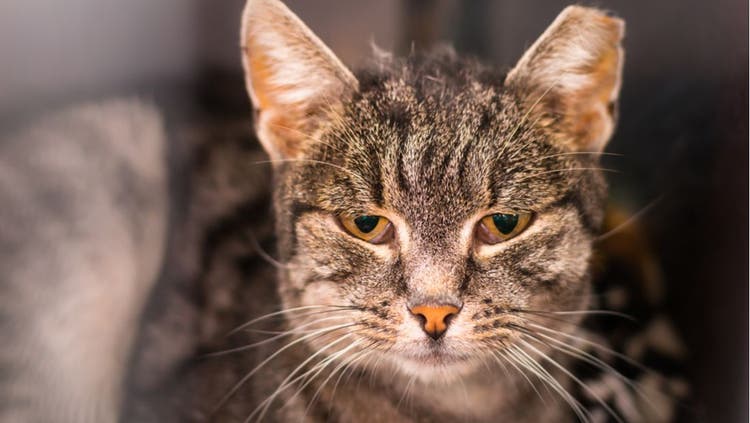
Can My Cat Get Coronavirus?
Yes and no. There’s no evidence to suggest your cat will contract COVID-19 (or give it to you), but cats can easily become infected with several forms of the coronavirus. Don’t worry though, you won’t need to buy them a surgical mask.
Feline Coronavirus and Feline Infectious Peritonitis
Not only can cats get coronavirus, the majority are already infected with a benign version. Feline enteric coronavirus (FECV) lives in the intestines, usually without causing symptoms. At worst, infections can result in vomiting and mild diarrhea. As with canine coronavirus, a typical adult cat will recover from these symptoms without additional veterinary treatment. In extreme cases, a vet may treat your cat for dehydration.
According to the Merck Veterinary Manual, the disease is practically ubiquitous. Positive antibody titers for FECV are found in 40% of all pet cats and 90% of cats in multi-cat households. At least 13% of cats are constantly shedding the virus in their feces.
While FECV on its own is only a minor nuisance, the disease can mutate into the much more severe feline infectious peritonitis (FIP). The mutation — how it happens and why — is still poorly understood. Cornell University’s College of Veterinary Medicine suggests that multi-cat households are more likely to see FECV and other strains of feline coronavirus mutate into FIP. This is the result of continuous circulation and contamination. In general, however, the mutation is quite rare.
FIP occurs in two distinct forms: wet (effusive) and dry (non-effusive). The former causes fluid to accumulate throughout the abdomen, which can lead to breathing difficulties. Dry FIP’s symptoms will vary, but typically include inflamed lesions across the cat’s body. Cats infected with either form will usually show other vague symptoms, including loss of appetite and lethargy.
As symptoms are usually mild, FECV tends to go undiagnosed. Diagnosing FIP, on the other hand, requires vets to piece together numerous symptoms and rule out a host of other diseases. There is currently not a dedicated test for identifying it.
Prevention and Treatment
FECV very rarely warrants treatment. Controlling and eradicating the disease is usually only a concern for rescue shelters and cat breeders. For these institutions, the Merck Manual advises a diligent approach to minimizing fecal contamination. Shelters and breeders should ensure they have the proper number of clean, disinfected litter boxes and take care to groom the hindquarters of any long-haired cats. Where practical, cats should be housed in small, closed groups of around 3 or 4 at most.
On paper, these same hygiene best practices should help reduce the spread of FIP. They are largely impractical, however, for shelters and breeders with dozens of cats. Without strict separation and sterile handling, cats can easily spread infectious particles to one another. Even separating cats isn’t always enough. Coronavirus is easily transported by clothes, shoes, and airborne dust particles.
Treating FIP has so far proved to be fruitless, even frustrating, for veterinarians. As the Merck Manual puts it, “The prognosis for a cat with FIP is very poor.” The best cat owners can do is monitor their cat’s quality of life and keep them pain-free. An FIP vaccine is available, but it is not considered effective. The American Association of Feline Practitioners has designated it “not recommended.”
A COVID-19 Update
At its March 27th press conference, Belgium’s Federal Public Health Service (FPS) confirmed that a Liege resident had infected their cat with COVID-19. The owner showed typical symptoms for about a week before the cat began to experience diarrhea, vomiting, and breathing difficulties.
The FPS encourages pet owners to wash their hands before and after handling their pets. Speaking to the Brussels Times, professor Stevan Van Gucht advised pet owners not to panic. “We want to stress,” he said, “that this is an isolated case. Additionally, in this case, we are talking about a human-to-animal transmission, not the other way around.” While all pet owners should practice good hygiene, there is still little evidence to suggest they will catch COVID-19 from their cats. Infected pet owners, however, should limit their contact with pets.
Stay Calm and Safe
Remember, the COVID-19 outbreak is a developing story. As the disease spreads, so will fear, uncertainty, and misinformation. Take care to identify reliable sources and consult them frequently throughout the coming weeks. The World Health Organization, for example, has published a thorough guide to the illness offering tips for preventing infection and seeking treatment.